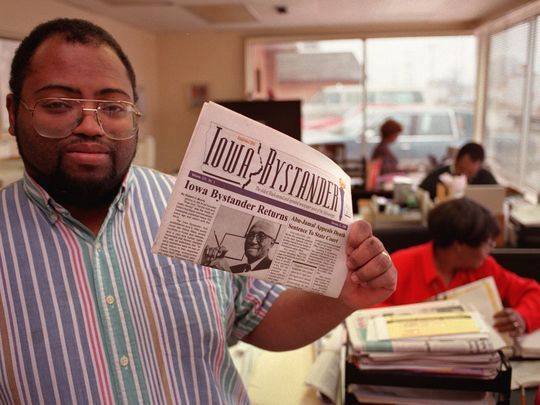Because if they do, they should stay on the present course.
I didn’t write much about the Des Moines school board campaign, because I don’t live in the school district and didn’t have a firm grasp of what all the eight candidates stood for.
As I noted last week, three incumbents kept their seats in a relatively high-turnout election. The outcome was a setback for school board member Jonathan Narcisse, who was hoping to get a few allies elected.
That said, it appears to me that the majority on the board is now overplaying its hand in an effort to further marginalize Narcisse. Not only do I suspect this will backfire, I also think they are wrong about the prevailing level of satisfaction with Des Moines Public Schools.
At its meeting last Tuesday, the school board majority chose not to act on Dick Murphy’s ill-advised motion to censure Narcisse, probably because Narcisse had retained the prominent attorney Alfredo Parrish. Instead, the board
referred his alleged misconduct to Polk County and state officials for further investigation.
Board members voted 5-1 to forward alleged violations of state ethics laws and school board policies to the Polk County attorney’s office and Iowa attorney general’s office. Narcisse abstained from the vote.
The board rejected member Teree Caldwell-Johnson’s proposal to refer the alleged violations to an independent agency for investigation before referring them to authorities.
“Not once in closed or open session has this board been presented evidence to support the claims,” said Caldwell-Johnson, who cast the lone no vote.
Narcisse isn’t going to win any awards for congeniality, but I doubt that this action will diminish his standing among those who elected him to the school board.
From what I gather, the people who are comfortable with current governance of the Des Moines Public Schools interpret the recent election results as proof that the people are satisfied with the status quo.
However, Narcisse represents a significant number of Des Moines residents who are concerned about graduation rates and other problems in the district’s schools. If he wants another term on the board, I wouldn’t bet against him finishing in the top four next September (when four seats will be up for grabs).
The Des Moines Register’s reporting on the school board race focused on the fact that three challengers backed by Narcisse lost. But did they really lose because of their association with Narcisse and his criticisms?
A major controversy that developed during the school board campaign received little attention in the Register’s reporting. Some community activists, led by the Interfaith Alliance of Iowa, repeatedly sounded the alarm about a threat to the school board from the religious right.
Gil Cranberg reported shortly before the election on the contents of the Interfaith Alliance of Iowa’s newsletter:
The headline on the lead article in the publication warns, “Religious Right Plots to Control Iowa’s Largest School District.”
The Alliance’s board represents a large number of religious denominations. Its mission includes challenging “political extremism based on religion;” and its goal is to ensure “that the work and influence of government and religious entities remain separate.” The Interfaith Alliance newsletter identifies the Iowa Family Policy Center as opposed to these goals and says it is “helping to elect three candidates to the school board.” The three are unnamed. Connie Ryan Terrell, the Interfaith Alliance’s executive director, said that’s to avoid engaging in electoral activity and jeopardizing the organization’s tax-exempt status.
The Alliance is not bashful though about bashing the Iowa Family Policy Center. The newsletter said the Center is “not supportive of public education and works tirelessly to privatize education by diverting additional public funds to private schools.” Further, the newsletter said, the Family Policy Center “advocates for prayer in school, teaching intelligent design as science curriculum and posting the Ten Commandments in public schools.”
If you read Cranberg’s piece, you will learn that those three unnamed candidates (opposed by the Interfaith Alliance and supported by the Iowa Family Policy Center) are the same three candidates Narcisse was supporting.
It wasn’t just one newsletter. The Interfaith Alliance of Iowa sent out several mass e-mails alluding to a threat to the public schools in Des Moines. One that I received on August 28 included this passage:
The religious right is not concerned about academic integrity, graduation rates or academic equity across a school district. Regardless of Supreme Court rulings or state law, the religious right inserts itself into school board races across the country to gain control of school boards and impose conservative Christian education and “family values” on the public school students. Their ultimate goal is privatization of the public schools, which you can be assured, will not be equitable. It is important these concerns are raised in the election process rather than debating them later at school board meetings.
I know you care about your community overall and specifically the children of your community. I ask you to get involved!
· Ask all the candidates if they have received the support (verbal, voter-organizing, or financial) of the Iowa Family Policy Center or the Iowa Christian Alliance.
· Ask all the candidates, do they support having a public education system or should the public education system be privatized?
· Ask all the candidates, if elected, what role will their faith and/or values play in shaping public policy for the school district? What is their view on maintaining a boundary between religion and government, including public schools?
· Ask all the candidates, would they vote to support or oppose the teaching of creationism, intelligent design, or Christian doctrine in the SCIENCE curriculum taught by the district’s teachers?
· Ask all the candidates, do they support or oppose the districts’ employment and student non-discrimination policies which includes sexual orientation and gender identity? And how would they work to enhance the implementation and effectiveness of this policy?
An e-mail from the Interfaith Alliance on September 2 urged readers to attend school board candidate forums and ask similar questions.
I am convinced that this issue is partly why turnout was so high on September 9. I know of people who voted for the Des Moines school board incumbents because they were worried about giving the religious right a foothold.
It didn’t help that two of the three candidates aligned with Narcisse sent their own children to parochial schools. Obviously, they still have a right to run for the school board, because their property taxes support public schools. On the other hand, many people felt that people who kept their own kids out of public schools should not be involved in governance of those schools.
Here is an excerpt from an e-mail the Interfaith Alliance of Iowa sent out the day after the election:
It’s a good day for public education, religious freedom and democracy!
Regardless of where you live in Iowa , most of you knew about the particularly bitter election battle for 3 seats on the Des Moines School Board.
Most of you were aware of the work of the Iowa Family Policy Center ( Iowa ‘s largest religious right organization) to “reclaim” Iowa ‘s largest school district. You understood the potential danger if that came to fruition, not only for the Des Moines school district but for the entire state.
And I am sure most of you know by now that IFPC was NOT successful in “reclaiming” the Des Moines schools! Voters across Des Moines averted IFPC’s efforts with an amazing turnout (about twice as many as last year).
The children, families, staff, schools, district and democracy won!
On September 18 the Interfaith Alliance of Iowa sent out a fundraising e-mail, noting with pride that
It’s been a little over a week since the voters in Des Moines resoundingly pushed back the efforts of the religious right to “reclaim” the Des Moines school board. Thank you for your support and for your help to inform other voters.
My point is that I would caution administrators and school board members not to conclude that the voting public are mostly satisfied with the Des Moines Public Schools. They may have supported incumbents for different reasons. If so, they may not be in a hurry to punish Narcisse next year.
Speaking of Des Moines residents who feel poorly served by the public schools, I support David Yepsen’s proposal to move away from at-large elections for seats on the Des Moines school board:
Winners who come out of individual districts have to listen to their constituents and work with winners from other districts to get things for their own. Out of that political process, everyone benefits.
At-large elections haven’t worked in the Des Moines schools. Instead, some neighborhoods feel left out. Huge majorities from one neighborhood can impose leaders on others. This is a particular problem in Des Moines, where for generations, the community has sometimes split into east-side, south-side and west-side factions.
It’s flared up again in our schools because the east-siders and south-siders think the west-siders, who often elect more of the board members, aren’t doing as much for the east-side and south-side schools as they do for their own. Never mind the facts that suggest otherwise – the feeling is there.
Electing board members from districts would help cure it. It would also encourage more people to seek office. As it is now, many qualified people from some neighborhoods don’t run for the board because they figure they have no chance in a citywide election. If candidates had to come out of districts, more new leaders would be tempted to run.
West-siders have dominated the Des Moines school board for a long time. Bringing some balance to the board would reduce tension in the community.
Continue Reading...



